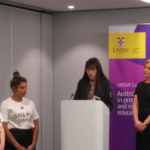NSW Top Cop Angry About Criticism of Strip Searches

The reaction of NSW police commissioner Mick Fuller to questions put to him during a budget estimates hearing on 29 August, reveals that despite its best efforts to show otherwise, the NSW Police Force is feeling the backlash against its misuse of strip searches.
Right now, most of the heat around the issue is emanating from a UNSW strip search report, which was released two weeks ago. Commissioned by the Redfern Legal Centre, the comprehensive report asserts that police use of strip searches has increased twentyfold since 2006.
At the hearing, Fuller was critical of the report, claiming that the figure of 277 strip searches carried out over the 12 months to November 2006 – quoted correctly from a 2007 NSW Ombudsman report – is wrong. The commissioner puts the number at around 800 to 1,000 for the same timeframe.
The man posing the questions, NSW Greens MLC David Shoebridge, then referred to an unidentified woman, who recently gave testimony at the NSW coronial inquiry into music festival deaths. She told the court that a police officer had threatened to make her strip search “nice and slow”.
And the commissioner took umbrage to this. He complained that “democracy” was at risk when she gave evidence “hidden behind the veil of anonymity”. But, none of Fuller’s complaints change the fact that 5,483 citizens had their freedom violated when officers forced them to strip over 2017-18.
A huge spike in anyone’s figures
“I found the commissioner to be in fairly stark denial of reality,” Mr Shoebridge said. “Even on his amended figures, there’s been more than a fivefold increase in the number of strip searches in the last decade.”
“And on the basis of figures produced by the Ombudsman – relied upon by Redfern Legal Centre – there’s a twentyfold increase,” he continued. “Either way that increase is without any additional powers. It is wholly as a result of changed police behaviour.”
In relation to the commissioner’s evidence regarding the coronial inquiry, the Greens justice spokesperson said he found it “deeply unsettling”, as it involved a young woman who’d “effectively been assaulted by police”, having her name suppressed by order of the court.
And Shoebridge explained that Fuller had representatives at the coronial inquiry, who would have been well-aware the woman’s name was withheld via a nonpublication order. So, in his estimate, it’s rather “unfortunate” that the commissioner is in the dark as to what actually transpired.
“Exceptional circumstances”
The Rethinking Strip Searches by NSW Police report was written by UNSW law academics Dr Michael Grewcock and Dr Vicki Sentas. The authors note that this procedure is a “significant violation” that sees the searched person not only stripped of their clothes, but also their “agency and control”.
“This report confirms that police are not applying the law as parliament intended,” explained Samantha Lee, Redfern Legal Centre head of police accountability practice. “A strip search is intended to be used as a last resort, applied only in serious and urgent circumstances.”
NSW strip search powers are set out in the Law Enforcement (Powers and Responsibilities) Act 2002 (LEPRA). Section 31 states that when an officer conducts a strip search in the field, they must have a reasonable suspicion and the “seriousness and urgency” of the circumstances must warrant it.
“It’s clear that the law is failing to provide rigorous guidance to police as to what circumstances are serious and urgent enough to warrant such a harmful and invasive process,” Ms Lee told Sydney Criminal Lawyers. And she added that the law should be clear on when they are appropriate.
Get sniffed
According to Ms Lee, another “misapplication of the law” happens when police conduct a “full-body strip search” based solely on the indication of a sniffer dog. As the report points out, a reasonable suspicion must be based on more than just a drug dog indication.
Indeed, the Sniff Off campaign has found that drug detection dogs have consistently gotten it wrong two-thirds to three-quarters of the time going back as far as 2009. And this highly flawed initiator accounts for around 20 percent of those who are ordered to disrobe in front of armed strangers.
Issues of consent
The report makes 12 recommendations, which Ms Lee describes as “modest, but critical”. She pointed to two key recommendations. The first being that police shouldn’t be allowed to strip search children between the ages of 10 and 17 unless a court order is issued.
And the solicitor also pointed to a recommendation around consenting to a strip search. It puts forth that people should not be able to consent to a strip search and that “the onus should fall to police to meet the legal requirements before subjecting someone to a strip search”.
At the moment, if a person gives consent to such a search, then it makes it legal, even if the officers don’t follow protocols properly. The issue here being that if the subject of a strip search gives consent, then the emphasis for officers to comply with the rules is suddenly taken away.
The UNSW strip search report was commissioned as part of the Redfern Legal Centre’s Safe and Sound campaign. Launched last December, the campaign has a focus on getting the “vague and legalistic” strip search protocols set out in the LEPRA overhauled.
Legislating the change
“This is the most comprehensive review of strip search powers that has been undertaken in NSW,” Mr Shoebridge underscored. “It shows that the police don’t understand the law or the facts. And unfortunately, the commissioner confirmed that in his evidence.”
The Greens MLC outlined that in the coming months two more reports relating to the use of strip searches by NSW police will be released. The first is the report of the NSW coronial inquiry into drug-related deaths at music festivals that delved into police drug dog and strip search use.
And then there’s the Law Enforcement Conduct Commission report into its investigation of police use of strip searches. The sole NSW police oversight body announced last October that it was launching an inquiry into the invasive practice after a number of specific complaints.
“Once those reviews are in, a very clear pathway will be established for legal reform in NSW,” Mr Shoebridge concluded. “And we will be bringing legislative reform in the parliament to narrow the powers, put additional checks and balances in, and to try and protect people’s civil liberties.”







